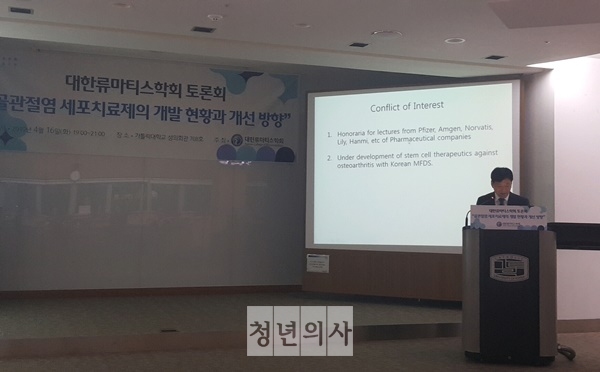Kolon Life Science’s gene therapy Invossa-K for arthritis treatment had inadequate clinical trials and lax approval procedures that eventually caused the drug to be suspended, a medical society said.
The Korean College of Rheumatology (KCR) discussed the Invossa issue at a debate forum on the “status of the cell therapies development for osteoarthritis and treatment improvement” at the Catholic University of Korea in Bucheon, Gyeonggi Province, Tuesday.
Rheumatologists said Invossa fell short of the international criteria to be released in the market.

Shin Ki-chul, director of KCR Biologics Registry and a professor at SMG-SNU Boramae Medical Center, said phase-1 to phase-3 trials on Inovssa did not have proper efficacy parameters and the drug’s efficacy was relatively low.
In clinical studies of osteoarthritis, the Osteoarthritis Research Society International (OARSI) recommends “a significant improvement in joint pain or physical function (50 percent or more)” or “20 percent or more improvement in at least two among the joint pain, physical function, and overall patient condition” as a criterion of therapeutic response.
However, Invossa studies’ criteria were based on the conventional International Knee Documentation Committee (IKDC) scores on knee function and sports activity, and its efficacy was not strong enough, Shin noted.
Comparing the phase-3 trial on Invossa with the phase-2 study on a new drug tanezumab by Pfizer and Lilly, tanezumab improved the scores by over 50 but Invossa lowered the scores by 20, Shin said.
“Although Invossa’s improvement in pain reduction was above the criteria, it was not big enough to be satisfactory,” he added.
In the evaluation of joint structure via MRI images six months and 12 months after the Invossa injection, compared with the placebo, Invossa did not show a meaningful difference, according to Shin.
Baek Han-joo, a professor of rheumatology at Gachon University Gil Medical Center, said Invossa’s clinical data was insufficient to win the marketing license. “The company was too much in a hurry to get a sales license, and that caused this mishap,” Baek said.
Baek criticized that discrepancies between the Ministry of Food and Drug Safety’s allegation and that of Kolon Life Science on Invossa cell ingredients are shaking the credibility of basic research to the core.
“There are clinical studies that must have been significantly problematic if the cells were not cartilage-derived. This is undermining the integrity of basic research, and the issue should not pass without a solid clarification,” he said.
While Kolon said the cells used for Invossa were GP2-293 cells from the first stage of the development, the ministry said Kolon’s data submitted for approval did not show any evidence that the ingredients were 293 cells.
The food and drug safety ministry was also responsible for allowing evidence-lacking Invossa to be rolled out in the market, the KCR said.
“The ministry had an obligation to ensure that the material submitted by the company for the public health was truly reliable. If the data was insufficient, it should have ordered the company to bring in additional data. The ministry will not be free from its responsibility,” said Suh Chang-hee, a professor at Ajou University Medical Center.
The KCR suggested establishing an open body to resolve the Invossa issue.
“The public body comprising of government officials, medical professionals, researchers, and patients should investigate the case and find a solution,” Baek said.

